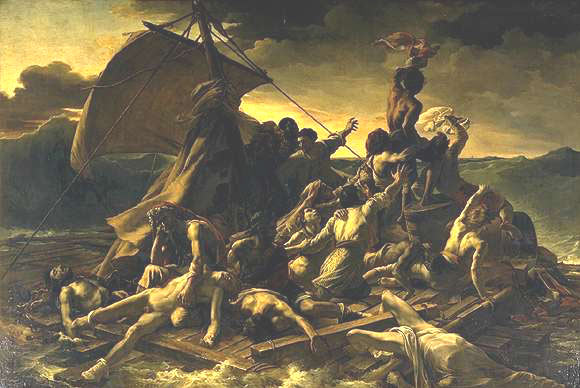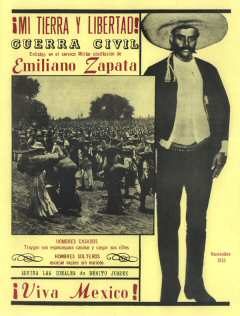Dedicated to John Riggi (1917-1992), an honorable man

Land and Liberty
Andrew Chrucky
Revised Sept. 24, 2005.
I look at the history of the United States from the perspective of a person who is forced, in one way or another, to work for a living, as contrasted, for example, to an American Indian who could go anywhere and do anything he wanted. As Rousseau put it: "Man is born free, and everywhere he is in chains." Why is this so?I see myself as a wage-slave. Because some may think I am exaggerating, let me explain. There is a broad sense of the term "slave" such that anyone who is forced to do anything by anyone else is a slave to that person. In this broad sense, children are normally slaves of their parents; wives are often slaves of their husbands; soldier are slaves to their superiors; worker are slaves to their employers; prostitutes are slaves to their pimps.
Slavery, in a narrow or technical sense, applies to the condition of people who are, in some sense, the property of some other person -- with or without the possibility of gaining freedom. The severest form of this condition is chattel slavery in which the master is free to kill the slave.
Slavery is, then, a continuum of conditions, with degrees of restrictions, degrees of penalties, and degrees of freedoms.
In general, as I view it, slavery consists of being forced to do work for someone else. This forcing can be direct or indirect. In civilized societies, all forms of slavery are the results of laws.
Direct slavery occurs where the law stipulates that a particular person is the slave, serf, servant, laborer, or apprentice of another. Some laws allowed people to sell themselves into bondage. An example of this is the American Colonial practice of indentured servitude, whereby for the price of passage to America an immigrant sold himself into servitude for a period ranging from 2 to 7 years.
Indirect slavery occurs when the penalty for not working for someone else is a deprivation of the means for existence -- a deprivation of access to subsistence land.
In the American colonies, it was unlawful to be a vagabond, i.e., a homeless person. Such people were arrested and made into laborers for someone or other. If no one could be found to take them, they were whipped and branded through the right ear. For a third offence, they were executed. As remnants of this policy, the United States still has vagrancy laws.
Direct slavery still exists in the United States in the form of military induction (when invoked). In such an event, a civilian is being forced to become a soldier. If he refuses, he will be imprisoned or, under some circumstances, executed. On the other hand, enlistment into the military is like indentured servitude -- one makes an agreement with the government to serve a number of years (technically it is eight years), and the punishment for breaking such an agreement (with exceptions) is normally imprisonment.
Indirect slavery is the result of a deprivation of access to free subsistence land. The United States does not provide for free access to subsistence land, and in this manner forces everyone to get money for subsistence. Even if one manages to buy some land (or even get it for a nominal fee as was provided by the Homestead Act of 1862), one cannot simply subsist on it, because there are always state property taxes to be paid. And if these taxes are not paid, the land is confiscated by the state.
For this reason alone, it is proper to call the present economic and government system of the United States one of wage-slavery. The ultimate land owner is the government which collects property, sales, income, and other taxes as it sees fit.
In addition, because the government does have an enormous amount of money, it is also the largest employer and buyer. The bulk of its budget -- about half a trillion dollars -- is spent on military agents and tools of enforcement -- airplanes, warships, tanks, bombs, missiles, bullets, and such. Often, the youth who are lured into the military are those who cannot afford to pay for education or job training. This is an "economic draft" which ensures that the United States government will have a steady supply of enforcers and canon fodder, drawn largely from the poor.
Capitalism, as I understand it, is the economic system which makes all land into a sellable and taxable commodity. It is a system which does not recognize an unalienable (unsellable) right to free land -- though such a right is implict in the Declaration of Independence as the unalienable (unsellable) right to the pursuit of happiness. Happiness, in this instance, is nothing more than subsistence, and one cannot subsist in an independent and self-sufficient manner without access to land.
All major peasant uprisings and peasant revolutions have recognized the connection between liberty and free land. And this sentiment was expressed by peasants; not by landlords or merchants (bourgeoise). Landlords simply wanted to maintain possession of their lands, while merchants wanted to purchase land. It was to the advantage of peasants only to have access to free land.
The English, the American, and the French Revolutions were not peasant revolutions -- they were revolutions of the aristocracy against a monarchy. Though there were many peasant and slave revolts throughout history, the first successful revolution of slaves was the Haitian Revolution of 1804. In the 20th century, the Mexican, the Russian, and the Spanish Revolutions are examples of three major peasant revolutions -- and it is not surprising that their slogans were "Tierra y Libertad," "Zemlya y Volya," Land and Liberty.
The purpose of Political Liberty is to foster Economic Liberty. Political liberty is needed to get agreement for economic policies. And although the United States allows more political freedom than any other country, because of media control by corporations, it is extremely hard to get a political consensus about better economic policies. Right now, both domestically and internationally, the United States is against any policy which would give away land for free to anyone, without also making it a sellable commodity. Consequently, the following may be a true generalization of U.S. foreign policy: it is a suffecient reason for U.S. intervention in another country, if that country adopts an agrarian policy of giving away land for free. The underlying reason is that a country of self-sufficient and independent land owners will not yield a pool of cheap wage-slaves, including soldiers, for capitalists.
"In former times the marauding minority of mankind, by means of physical violence, compelled the working majority to render feudal services, or reduced them to a state of slavery or serfdom, or at least made them pay a tribute. Nowadays the dependence of the working classes is secured in a less direct but equally efficacious manner, viz. by means of the superior power of capital; the labourer being forced, in order to get his subsistence, to place his labour power entirely at the disposal of the capitalist. So there is a semblance of liberty; but in reality the labourer is exploited and subjected, because, all the land having been appropriated, he cannot procure his subsistence directly from nature, and, goods being produced for the market and not for the producer's own use, he cannot subsist without capital. Wages will rise above what is wanted for the necessaries of life, where the labourer is able to earn his subsistence on free land, which has not yet become private property. But wherever, in an old and totally occupied country, a body of labouring poor is employed in manufactures, the same law, which we see at work in the struggle for life throughout the organized world, will keep wages at the absolute minimum" F. A. Lange, Die Arbeiterfrage. Ihre Bedeutung fur Gegenwart und Zukunft. Vierte Auflage. 1861, pp. 12, 13. Quoted by H. J. Nieboer, Slavery: As an Industrial System (Ethnological Researches), 2d edition, 1909, p. 421.
